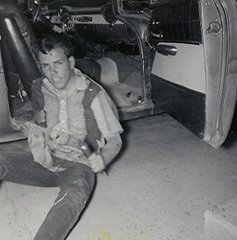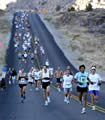
Determinism, rather than justice or the idea that good always wins, is the philosophical proposition that every event, including human cognition and behaviour, decision and action, is causally determined by an unbroken chain of prior occurrences. I compare this approach to life to the comments of Nibley, a favorite author, who wrote that "it did not matter what we expected from life, but rather what life expected from us". He added that "it's not what happens to you that matters. It's not what becomes of you, it's what you become that 's important."
*
Nibley suggests that we can change who we are by how we react. He is suggesting that we are in a process of "becoming something". The "Determinist" would conclude that even in the act of trying to "respond our responses" that our choices really would just be outcomes.
*
It seems to me that "life" is bigger than the individual. What I am saying is that even though all actions get down to cause and effect that it just is not possible to see all that plays into the potential causes and effects of actions and decisions. Nibley is correct. Life will expect things from us that we won't see coming.
*
I would suggest that to allow "life" to help us "become something" requires the use, not just of best decisions that we can make, but the best "motives". Motive then would be something whose impact would transcends the determinist's view of all results being beyond the simple laws of cause and effect. Of course the rebuttal to this would be that a motive would follow a process that would predict the result but I think that the way to get free from this is to look outward to the "object of the motive". The highest motive I am suggesting is "selfless". Selfless could me a lot but it would include the "pure love of Christ", virtue, and choices outside of personal advantage. If such a thing is possible as choices that are selfless then that would be enough to break free of a determinist view of outcome since the effect of the choices would rely on an outcome not known.
*
Those that want to help or act, because they think it is the right thing to do, by their very nature would be more liberal and it "ought to follow" that they ought to be more religious. Acting only in ones self interest by its nature would be more conservative and it would follow that these motives then would be less religious since they would be lessconcerned about others rather than self.












1 comment:
I don't know about you, but I'm pretty sure I remember hearing back in Sunday School that Jesus was in favor of hating illegal immigrants, making sure everyone had a gun, starving the poor, detesting sinners (or gay folks if you like) and unprovoked wars of aggression that kill millions of innocent people.
I don't remember anything about that whole forgiving the thieves on the cross or healing the poor and sick and throwing the money changers out of the temple or anything..
Nope, I'm pretty sure it was all about greed hate and war.
Post a Comment